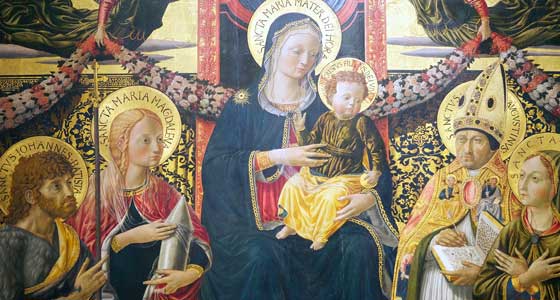Holy Mary, Mother of God?
Is Mary the Mother of God?
Let's look at one argument non-Catholics use against this claim, and how to respond.
The belief that Mary is the mother of God is not unique to Catholicism. The vast majority of Christians accept this dogma, with only a minority of people in the Protestant community objecting. One text that is appealed to in support of this belief is Luke 1:43. There, Elizabeth, inspired by the Holy Spirit, exclaims to Mary, who just arrived in her presence, “Why is this granted me, that the mother of my Lord should come to me?” Since Elizabeth was a good Jew, and Jews normally used the word Lord in the place of the tetragrammaton (God’s name), YHWH, Elizabeth is calling Mary the mother of God. Therefore, we have a possible biblical foundation for the dogma of Mary, mother of God.
There are many comebacks that Protestants have to the belief in Mary as the mother of God. But there’s really only one counter-argument made to using Luke 1:43 for scriptural justification of Mary as the mother of God. It targets the assumption that “lord” is intended by Elizabeth to refer to Almighty God.
There is a counter-argument that some Protestants make to the use of this text for Mary’s sinlessness. But we can consider it here for our purposes of defending the appeal for Mary as mother of God, as will become evident below.
“Elizabeth simply uses the title ‘lord’ in the sense of an earthly ruler. She’s referring to the fruit of Mary’s womb, Jesus, as her messianic king, not the divine messianic king.”
Protestant Bible scholar Walter L. Leifeld argues that we shouldn’t interpret this as a reference to Mary, “mother of God.” His alternative interpretation is that Elizabeth was referring to Jesus as the Messiah. He writes:
Nowhere in the [New Testament] is Mary called “mother of God.” Deity is not confined to the person of Jesus (we may say, “Jesus is God,” but not all of “God is Jesus”). She was, however, the mother of Jesus the Messiah and Lord.
The evidence he gives is the fact that Luke frequently uses “Lord” as a title, 95 out of 166 occurrences in the synoptics. And not every use is charged with a divine meaning. Moreover, so Leifeld argues, Jesus is called “Lord” elsewhere in the Lukan birth narrative in a non-divine way (“For to you is born this day in the city of David a savior, who is Christ the Lord”—Luke 2:11).
Answering the Comeback
With regard to the use of “Lord” in reference to Jesus in Luke 2:11, it’s not clear whether it’s being used in a divine or non-divine way. There is nothing in the text that suggests either interpretation. Leifeld simply asserts its divine use without argumentation. Given such ambiguity, we can dismiss this text as evidence for Leifeld’s conclusion.
There’s no doubt, however, that the Greek word translated “Lord,” kurios, is used in a non-divine way in the New Testament (e.g., 1 Cor. 8:5), even by Luke (e.g., 12:36, 37, 42, 43, 45, 46, 47). However, it’s not the word by itself that indicates that Mary is the mother of God. It’s how Luke sees Elizabeth using it.
There are several details that indicate that Luke is drawing a parallel between Mary and the Old Testament Ark of the Covenant. Take Elizabeth’s words themselves, for example. They are almost perfectly mirror David’s in 2 Samuel 6:9, when he says in the presence of the ark: “How can the ark of the Lord come to me?” Other parallels include John the Baptist leaping for joy in the presence of Mary in Luke 1:44 and David “making merry” before the ark in 2 Samuel 6:5. According to Luke 1:39, Mary remains with Elizabeth for three months, similar to how the ark remained in the house of Obededom for the same amount of time according to 2 Samuel 6:11.
Now, since Luke is paralleling Elizabeth’s “mother of my Lord” with David’s “the ark of the Lord,” it stands to reason that Luke intends for us to take Elizabeth’s cry as a reference to almighty God. “Lord” in the phrase “ark of the Lord” wasn’t a reference to the Messiah. The ark was the ark of almighty God. Therefore, we have good reason to interpret Luke 1:43 as a reference to Mary being the mother of God, contrary to Leifeld’s claim.
Did you enjoy this excerpt from Karlo Broussard's newest book,Meeting the Protestant Response? Order your copy today
Recent Posts
-
Are We Superior to the Early Christians?
If the early Church was the Catholic Church, why can’t we say that Christians just lost their way ea …Jul 15th 2024 -
Did the Early Christians Get Things Wrong?
You can find countless variations of the claim that early Christians believed Protestant things: …Jul 1st 2024 -
How to Respond When the World Tells Us We Can "Build Our Own Deity"
The necessity of revelation and of knowing God on his terms is not accepted in our culture today. A …Jun 22nd 2024










